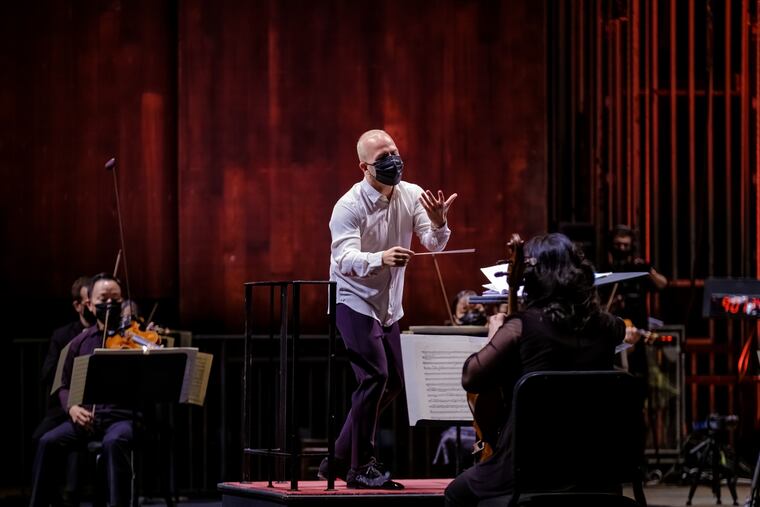With Steve Martin and Angel Blue, the Philadelphia Orchestra’s opening concert is a victory online
The beautifully executed evening also included a knockout performance of Valerie Coleman’s "Seven O’Clock Shout," already sounding like an American classic.

It seems fair to say that few of us over the years have been able to wash the dinner dishes at 6:45 p.m. and make it to our seats for opening night of the orchestra well before 7.
But it’s a different world now for the Philadelphia Orchestra and its audience, and that’s where Wednesday night’s opening of the group’s 121st season found us.
It’s no surprise that the program was entirely virtual. What was striking, however, was how superbly the orchestra pulled off the 80-minute online presentation, musically and logistically.
And how poignantly. These performances, captured over two days last week at the Mann Center, ended with the musicians rising and taking bows to the stony silence of an empty house. The act was both moving and a bit disturbing, a pantomime on the challenges of making a human connection in the COVID-19 era.
This year’s opener, though, did come with enormous human presence, even if it was largely invisible. Wednesday night’s stream attracted 1,070 viewers and a gross fund-raising haul of $470,000. (The show remains viewable for $50 via the orchestra’s website through Oct. 7 at 11 p.m.)
The virtual concert marked the first time we’ve heard the entire ensemble since March, and even this concert didn’t feature the orchestra at full force. The configuration changed with the piece.
“This will be my third collaboration with the Philadelphia Orchestra,” said Steve Martin to camera, “which means during quarantine the orchestra has lost its mind.”
On banjo, the comedian played “Rare Bird Alert,” a snappy piece whose orchestrations by tuba player Carol Jantsch came speckled with individual players doing bird calls — or, more accurately, “bird” calls. Oboist Peter Smith emulated a “double-reeded canary” (“noiseum obnoxious”) by blowing through his own double reed. Conductor Yannick Nézet-Séguin leveraged his national origin with the sound of a “Canadian goose” (“goofus canadiensis”).
Martin’s appearance electronically married distant forces, with the orchestra at the Mann and him strumming from some remote location. Billie Jean King, as host, also popped in from parts unknown. But for the most part, it was the orchestra on stage at the Mann Center performing at long last, Prometheus unbound.
This is the start of a series of about a dozen streamed concerts planned for between now and mid-December, and the format is, if not quite live, close to it. You could tell by tracking an on-stage digital clock during a lithe interpretation of Mozart’s Symphony No. 29 that, unless time now travels backward, what you were seeing wasn’t a single take from beginning to end, but involved an occasional patch from another performance.
The scale of editing didn’t approach that of a professional recording, orchestra artistic planning vice president Jeremy Rothman told me. “We wanted to give people the sense that they were hearing the orchestra nearly live,” he said.
In fact, what was wonderful about the production by a collaborative team (Jim Cotter was executive producer) is that it conveyed that live feeling, but with a lot of extras that you don’t get live in the concert hall. Shots of players were smartly chosen, often moving apace with the music. In the most positive sense, the online medium falls away and you really can focus on the music.
Valerie Coleman’s Seven O’Clock Shout, previously presented online in an engineered version, was performed for the first time with the orchestra assembled in person. It came across here as even more of a knockout than before. The piece celebrates front-line pandemic workers, and with the musicians on stage wearing black masks and playing from behind acrylic screens, it had special resonance.
The power, though, comes from the music and Coleman’s deft way with emotion, from the pastoral awakening of the opening, to the energetic hope of the middle section, and on to a proud final flourish. Though just months old, the work sounds like an American classic.
Soprano Angel Blue joined the orchestra for “Timor di me?...D’amor sull’ali rosee” from Verdi’s Il trovatore. Her voice has both a sparkling purity and reserves of soaring emotion.
The excerpt and other pieces on the program were also a good chance to survey a changing ensemble. Horn player Christopher Dwyer is new this season, while French oboist Philippe Tondre has yet to arrive. The orchestra’s principal oboist, signed in February, has been thwarted by coronavirus-related immigration restrictions.
Popular pianist Lang Lang was on hand, and there was something in his appearance that captured the spirit of this opening concert. He had been slated to be here for opening night in Verizon Hall. As it was, he sent in his performance from China, an excerpt from Bach’s Goldberg Variations.
He chose the 30th variation, the “quodlibet,” which he explained the Bach family used as a kind of family reunion song, “and I can’t wait to return to Philadelphia and to have a beautiful reunion time with my second home in America.”
The concept of reunion hovered nearby all evening. There’s a long way to go before the orchestra and its audience are truly back together. But this effort, beautifully executed as it was, felt like victory already.
The Philadelphia Orchestra’s 2020 opening night concert is available at philorch.org through Oct. 7 at 11 p.m. Tickets are $50.